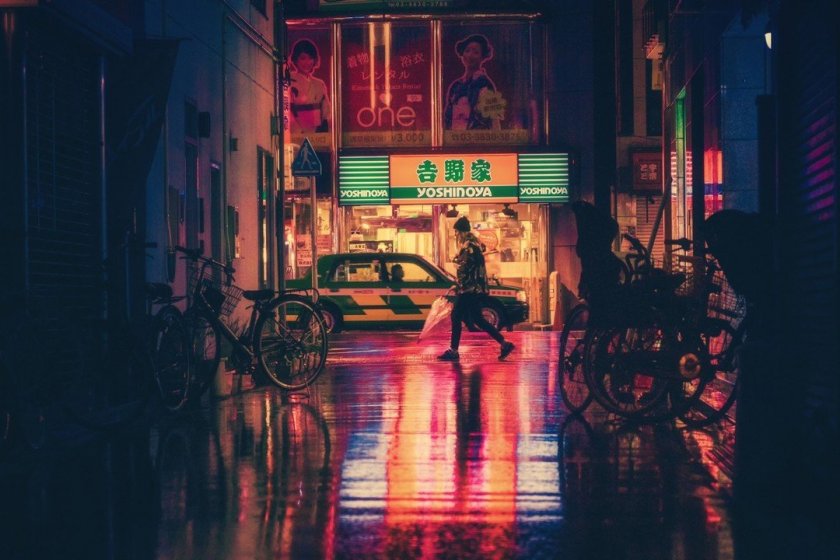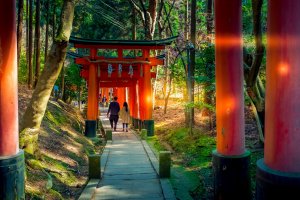That missed step in the dark, the surge of panic as you fall and scramble to right yourself is only made more embarrassing when it's not dark. When it's broad daylight, in public and people are staring at you...
That is the feeling you will find yourself drowning in on your first trip to Japan. With so many unspoken rules and no one to tell you about them, you'll often find yourself the center of attention for all the wrong reasons.
If I knew then what I know now, my first time in Japan would have involved less awkward silences and more successful ventures. Alas, hindsight is 20/20, but you can laugh & learn from my mistakes.
Below are four uncomfortable situations to avoid if you are planning on visiting Japan.
The Tipping Point
A red-faced Japanese waiter sprinting through the overcrowded streets of Tokyo, gripping a handful of Yen and shouting at someone is enough to grab the attention of everyone.
Unfortunately, the person they're shouting at is me.
Once was enough for me to learn my lesson.

Whether it's a restaurant, hotel or taxi journey, tipping someone is just not done in Japan. Why? Japan believes in pricing services at what they are worth, no less, no more. Imagine that.
Paying your bill at a restaurant isn't just about the cost of food, but the entire experience. From the location of the restaurant to the excellent customer service, the bill covers everything. So why are you trying to pay more?
To most of us, tipping is a way of showing gratitude, but in Japan, offering notes rummaged from jean pockets in view of everyone is considered crass and creates a rather uncomfortable choice for your waiter:
Accept the tip, so they can avoid awkwardly trying to explain the concept of 'No Tipping' to you in broken English or chase you through the streets of Tokyo to return your 'forgotten' money.
You know which choice my waiter made.
There is something akin to tipping in Japan, but it's only performed in rare circumstances when a person goes above and beyond what anyone expects of them. Like bar staff walking you back to your hotel room at 5 am, because you couldn't find your way home...true story.
If, like my drunken friend, you're in a situation where you feel compelled to show gratitude towards someone financially, do what he did, buy an envelope.
Place the 'gratitude' money, not tip, in a pretty little envelope and find a quiet moment to pull your helpful benefactor aside. Offer the envelope with both hands, alongside a slight bow. You may have to insist a little, but this is by far the least uncomfortable way to offer money as thanks.
Just keep in mind, you're not offering money for a job well done like you would a tip. Instead, you're expressing gratitude towards someone that wasn't obligated to do so much for you.
You may think it a subtle distinction of no consequence, but in Japan, subtlety is a pillar of social interaction.
You're a Foreigner, Police May Stop You
As I strolled down the streets of rural Osaka with my 6.4 foot tall, well-built, white friend, it comes as no surprise the pair of us drew attention. Even from the police.

Why? Statistics.
Foreigners make up around only 1.2% of Japan’s total population, with only a fraction of that 1.2% being ethnically non-Asian. Most of that tiny population resides heavily within the Tokyo and tourist districts of Japan. It’s no surprise then, that outside those areas you are an anomaly.
Try as you might, for better or worse, it's almost impossible that you will go unnoticed in such a homogeneous country.
It was with that in mind, I wasn't too surprised to witness a motorbike-mounted police officer decide to pull over, dismount and slowly make his way towards the two of us.
With a nervous glance at one another, my friend and I silently asked the same question.
“Did you bring yours?”
You see, when visiting Japan you are legally required to carry your passport or residence card with you at all times.
Police have the legal authority to ask you to present one of these two forms of identification, anytime, anywhere. If you fail to do so you could receive a criminal charge or fine.
However, you are highly unlikely to get spot-checked in tourist hotspots, it's just not practical with so many tourists around.
After nervously handing over both our residency cards to the officer and answering a few formal questions: purpose in Japan? Current residence? Length of stay? The conversation quickly devolved into the typical tourist questions: Do you like Japan? What foods have you tried? Do you like natto?
We felt foolish for getting worked up over nothing, but that's understandable. Most of us assume unexpected interactions with police to be a negative experience.
I could debate the ethics and efficiency of Japanese Law enforcement, however, that's an article all by itself.
For now, all I'll say is your experiences will be mostly positive, but why risk creating a problem by breaking the law?
Don't leave your identification at home.
Only the Clean May Bathe
You may have heard about that nightmare. The one in which you're surrounded by a crowd of people, where you look down to find yourself completely naked and people are staring at you.
Turns out, Japan can make that nightmare a reality for you.

Japan has a long history of public bathing and Onsens (Hot Springs). Although at first, the idea of getting in a bath with strangers isn't the most appealing thought, it's something I highly recommend you try at least once.
In Japan, I spent a large amount of time in Beppu, a town famous for its natural hot springs.
The small town boasted over 40 hot springs to choose from, ranging in styles and prices. With the abundance of hot springs and one less than 30 feet from my front door, it was hard to avoid the experience for long.
But I knew, like everything else in Japan, there is a right way to do something and a wrong way, even bathing.
Here is a quick guide to avoid drawing attention to your naked self:
Don’t Hedge
Don’t try to bring your bathing suit or swimming trunks. You’re not allowed to wear them. In fact, wearing anything at all will just bring you unwanted attention. Don’t worry, Onsen are divided by sex, so put those concerns to rest.
False Modesty
If the Onsen you attend provides you with towels, you will most likely come across the modesty towel. You are normally given two towels, one is larger and is for drying yourself after you’ve bathed; that one stays in the changing room with your clothes. The other is a smaller towel, used to cover yourself as you move around.
Gents, if your waist is small enough you can wrap the towel around yourself or just hold the towel in front of your waist. Ladies, the towel is just long enough that you can cover your chest and have it hang down far enough to cover your waist.
The towel is not for washing yourself with and should not enter the bathwater. You can fold the towel and place it atop your head as you bathe or just set it on the edge of the bath before getting in.
Although the towel isn't big enough to cover much, you will be surprised how much comfort a small piece of cloth can provide on your first trip to an Onsen.
Shower Before You Bathe
In Japan, whether at home or an Onsen, you wash before getting into the bath. Bathing is about relaxing in clean water, which you have to share with everyone else. Find the shower cubicles, sit on one of the provided stools and go about your hygiene routine. Rinse any soap thoroughly from you, before heading to the bath.
Hair Tie
For both men and women, if you have long hair you will need to tie it up. Your hair should be lifted away from the bathwater and shouldn't come into contact with it.
Tattoos
This is a tricky one. Many Onsens will outright turn you away if you have a tattoo, the same is true for some gyms. The reason is tattoos are still heavily associated with the Yakuza, the Japanese mafia.
Even though the likelihood of a foreigner being a part of the Yakuza is next to zero, the symbolism can still make some people feel uncomfortable and so your entry may be denied.
The best thing to do is to ask beforehand if tattoos are allowed at the Onsen you are going to or buy some skin-tone plasters. If your tattoo is small enough you can normally get away with just covering it with some skin-tone plasters or a skin-tone sleeve.
Women Only
If as a man, you feel that you haven't had ample opportunities to embarrass yourself in front of the opposite sex, Japan has you covered.

Tokyo’s trains are legendary for being overcrowded during rush hour, London’s underground doesn't even come close!
Due to this, you can often find people positioning themselves to enter a carriage that won't leave them crushed by the torrent of commuters.
However, It was this same impulse that caused a friend to slip into a shorter line and enter a carriage with ample space. Settling into a comfortable corner with a triumphant feeling of beating the system, it was only seconds before he found he’d made a horrifying mistake.
As mentioned before, it’s normal to be stared at in Japan. Quickly you learn the difference between a curious glance and a look that has weight behind it. A look that builds the longer it's held, a pressure that grows on your skin until, my friend was forced to look up and see who was staring at him.
Everyone.
There is something truly unnerving about a cramped room, filled with the opposite sex, starting at you. In a place where only women should be.
You see, in some of the major cities of Japan, like Tokyo and Osaka, during rush hour and other specific times, cities have women-only carriages.
Why?
Due to Japan’s overcrowding in trains, throughout the years Japanese women have suffered from an excessive groping issue. With so many people packed into one train, it’s hard to tell exactly who’s hands are doing what. Combine that with the Japanese preference to avoid open confrontation, most offenders go unpunished.
Over time, the Japanese rail companies decided to implement women-only carriages at certain times, to reduce the number of groping incidents.
With many of the signs for women-only carriages in Japanese and not glaringly obvious, if you don't know what to look for, it's not hard to make this mistake.
Don't panic. The worst that will happen to you is a deep sense of embarrassment and a ¥10 fine, that's only $0.10.
Your best course of action is to walk through to another carriage or make yourself small and get off at the next stop.
Maybe we should debate as to whether women-only carriages solve the problem of groping or just sweeps a deeper social problem under the rug, perhaps a future article.
In any case, I may not be the best person to know the answer as I have only had the one uncomfortable experience on a Tokyo train with an elderly lady reaching to hold on to something, but that was an accident… I think.
























